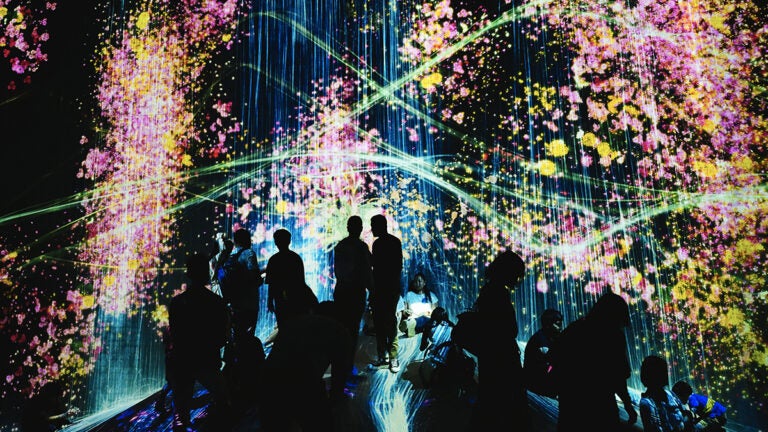
New research center explores the impact of innovation on society
You might remember the viral video of a 1-year-old child growing frustrated by a glossy magazine that would not respond to her pinch and swipe like her parents’ iPad. Having first been introduced to the tablet technology, the child appeared to view the paper publication as defective.
Entertaining as this video may be, it raises complex questions about society’s relationship with technology. What, for example, might change in a world where new generations are digitally literate far before they are traditionally literate?
Of course, innovation has always recast the ways in which a public collectively engages, laying bare its utility and promise well ahead of its oft-unintended consequences. No one foresaw that Guttenberg’s printing press would lead to the publication of a popular book outlining how to identify and sentence witches, leading to the execution of scores of innocent people in the pre-Enlightenment. But never has the pace of innovation riveled what we are experiencing in the 21st century.
While we are drawn to reports on the latest gizmo or treatment for disease, it is increasingly clear that we need to better understand the social, economic, political and ethical implications of innovation — especially those that are not immediately obvious. This is the driving force behind the USC Dornsife Center on Science, Technology, and Public Life. Formally launched in December 2020, the new center is a venue for collaborative reflection and rigorous research on a scientific and technological ecosystem that is changing in real-time.
What are they thinking?!
“The center seeks to improve our understanding of the implications of new technologies, like artificial intelligence (AI) and genomics, that have gotten a lot of public attention,” said Professor of Sociology Andrew Lakoff, who is director of the center. “But it is also looking at the role of technologies that profoundly shape social life but tend to remain below the radar, like logistics and infrastructure.”

Developed with seed funding from two anonymous donors, the center includes 18 faculty affiliates with interests in science, technology and society, and with a range of disciplinary affiliations.
The center is designed around three broad intellectual areas that are particularly fraught in terms of the social and political impact of scientific and technological innovation.
The first explores the implementation of policy to address the planet’s environmental crises. A group of researchers is keyed in on urban ecosystems, with a focus on Los Angeles. They are working to make better sense of a region characterized by rapid urbanization, complex infrastructural and governance systems, and significant ecological challenges.
The center also grapples with innovations in biomedicine and the life sciences, an area that has recently been in the public spotlight as the COVID-19 pandemic sparks difficult questions. Ethical concerns about genetic engineering, for example, frequently focus on using technology to create “designer babies” by manipulating the human genome to produce desired physical traits. However, we rarely hear about the genetic engineering of pathogens to increase their virulence or transmissibility — research that can improve our understanding of infectious disease but that also carries a potentially catastrophic risk of accidental release.
The third core area of study at the center is in the social and ethical impact of new digital technologies. “USC has a tremendous group of scholars who look at the societal impact of developments in algorithmic systems, facial recognition technology and artificial intelligence,” Lakoff said. From decentralized banking regulations to criminal profiling, the center serves as a hub for scholarly engagement with high-stakes policy questions.
Complex supply chain logistics has recently been on the top of Lakoff’s mind, as the pandemic unearthed unanticipated challenges. Early in the crisis, there were difficulties in obtaining enough protective gear for medical professionals and essential workers. And who can forget the empty shelves in the toilet paper aisle? Massive changes were needed in the information infrastructure that links manufacturers, ports and trains to hospitals and retail outlets — changes that require both new algorithms to streamline delivery and new discussions of equity and ethics. Going forward, scholars could explore what assumptions underly pandemic preparedness planning or ask how essential workers should be defined and protected.
Additionally, the center offers a number of educational and public engagement opportunities. Ph.D. students at USC can earn a graduate certificate in science and technology studies by completing four courses and integrating meaningful ideas from their studies into their dissertation projects.
Berggruen Fellows
The center hosts another major activity in the USC Berggruen Fellowship Program, a partnership with the Los Angeles-based Berggruen Institute. Each year, six to eight prominent scholars or nonacademic experts spend roughly a year interacting with USC faculty and students as they work on ambitious research projects.
“With these fellowships, the Berggruen Institute supports a group of terrific scholars, journalists and artists — but the goal is not for them to work in isolation,” said Lakoff. “That’s where USC comes in. We provide a range of possibilities for making high-level intellectual connections and developing collaborations.”
In a recent online event, for example, scholars from USC and other institutions discussed Berggruen Fellow Lana Swartz’s ideas on framing money as a form of communication technology, from the ways that a particular credit card reflects identity to the implications of Venmo, an app that enables you to both pay another party and post your transactions for friends to see. This emerging area of study is ripe for new ways of thinking.
“Hearing from fellows with different experiences and perspectives has forced me to ask new questions about my own understanding of technology and its social impact,” said Swartz, who earned her Ph.D. in 2015 from USC Annenberg School for Communication and Journalism. “Speaking with international researchers and hands-on practitioners demystified some of the … realities of technology as it lives in the world.”
A universal charger
USC has a wide range of scholars with interests in the impact of science and technology on social life, but individual scholars are often scattered among different schools and departments. The Center on Science, Technology, and Public Life looks to serve as bridge, amplifying research that will benefit from administrative structure and facilitating conversation among people who might not otherwise meet. It will also host a variety of workshops and conferences that invite civic and business leaders to join academic experts in thinking through new issues related to scientific and technological innovation.
“I’d like us to be seen as a place where new ideas emerge, where scholars and students are able to develop novel projects with our collaboration and support,” said Lakoff. “I also would like to engage faculty members who don’t necessarily think their work links to this area to consider ways in which they might connect their work to the problems the center is focused on.”